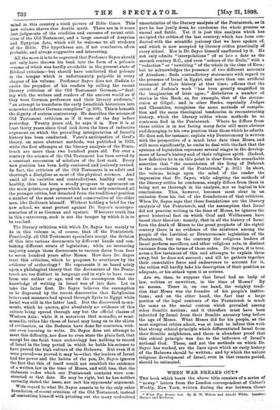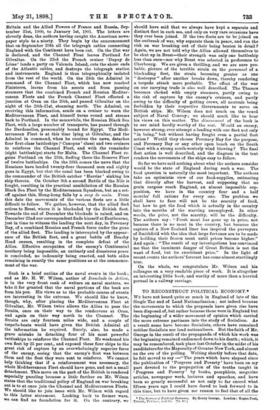WHEN WAR BREAKS OUT
THE book which bears the above title consists of a series of " newsy " letters from the London correspondent of Calner's Weekly, New York, written during the war between Great • When War Breaks Out. By H. W. Wilson and Arnold White. London: Harper and Brothers. Britain and the Allied Powers of France and Russia, Sep- tember 21st, 1900, to January 1st, 1901. The letters are cleverly done, the authors having caught the American news- paper style to a nicety. They begin by the announcement that on September 20th all the telegraph cables connecting England with the Continent have been cut. On the 21st war is declared, and the Channel Fleet leaves Portland for Gibraltar. On the 23rd the French cruiser Dupuy de Lome' lands a party on Valencia Island, cuts the shore ends of the Atlantic cables, and destroys the telegraph station and instruments. England is thus telegraphically isolated from the rest of the world. On the 24th the Admiral in command of the Channel Fleet, which has now reached Finisterre, learns from his scouts and from passing steamers that the combined French and Russian Mediter- ranean Fleets and the French Channel Fleet effected a junction at Oran on the 20th, and passed Gibraltar on the night of the 20th-21st, steaming north. The Admiral, on receiving this information, sends on a cruiser to warn the Mediterranean Fleet, and himself turns round and steams back to Portland. In the meanwhile, the Russian Black Sea Fleet, with a large number of transports, has passed through the Dardanelles, presumably bound for Egypt. The Medi- terranean Fleet is at this time lying at Gibraltar, and the Admiral in command, when he receives the news, detaches four first-class battleships (' Canopus' class) and two cruisers to reinforce the Channel Fleet, and with the remainder (eight battleships) starts for Malta. The Channel Fleet re- gains Portland on the 25th, finding there the Reserve Fleet of twelve battleships. On the 26th comes the news that the Russians have landed twenty-four thousand men and eighty guns in Egypt, but that the canal has been blocked owing to the commander of the British catcher Harrier' sinking his ship therein. On October 8th a second Battle of the Nile is fought, resulting in the practical annihilation of the Russian Black Sea Fleet by the Mediterranean Squadron, but as a set- off against this, Hong-kong falls by a coup de main. From this date the movements of the various fleets are a little difficult to follow. We gather, however, that the allied fleet retires to Brest, where it is blockaded by the British fleet. Towards the end of December the blockade is raised, and on December 22nd our correspondent finds himself at Eastbourne, just in time to witness the landing the next day, in Pevensey Bay, of a combined Russian and French force under the guns of the allied fleet. The landing is interrupted by the appear- ance of the British fleet, and a great battle off Beachy Head ensues, resulting in the complete defeat of the Allies. Effective occupation of the enemy's Continental territory being impossible, an untimely and disastrous peace is concluded, no indemnity being exacted, and both sides remaining in exactly the same positions as at the commence- ment of the war.
Such is a brief outline of the naval events in the book ; and as Mr. H. W. Wilson, author of Ironclads in Action, is in the very front rank of writers on naval matters, we take it for granted that the naval portions of the book are from his pen. His views as to the probable course of events are interesting in the extreme. We should like to know, though, why, after placing the Mediterranean Fleet at Gibraltar, Mr. Wilson twice allows the Allies to pass the Straits, once on their way to the rendezvous at Oran, and again on their way north to the Channel. The Straits are only fourteen miles wide, and a couple of torpedo-boats would have given the British Admiral all the information he required. Surely, also, he made a grave mistake in detaching four of his most powerful battleships to reinforce the Channel Fleet. He weakened his own fleet by 25 per cent., and exposed these four ships to the great risk of capture by an overwhelmingly superior force of the enemy, seeing that the enemy's fleet was between them and the fleet they were sent to reinforce. We cannot help thinking that if a reinforcement was necessary, the whole Mediterranean Fleet should have gone, and not a small detachment. This move on the part of the British is rendered especially puzzling because a little further on Mr. Wilson states that the traditional policy of England on war breaking out is to at once join the Channel and Mediterranean Fleets. We should like to join issue with Mr. Wilson with regard to this latter statement. Looking back to former wars, we can find no foundation for it. On the contrary, we should have said that we always have kept a separate and distinct fleet in each sea, and only on very rare occasions have they ever been joined. If the two fleets are to be joined on the outbreak of war, why separate them in peace, and run the risk on war breaking out of their being beaten in detail P Again, we are not told why the Allies allowed themselves to be shut up in Brest—their strength was only one battleship less than ours—nor why Brest was selected in preference to Cherbourg. We are given a thrilling, and we are sure pro- bable, picture of the terrible strain on the personnel of a blockading fleet, the strain becoming greater as one " destroyer " after another breaks down, thereby rendering a torpedo attack more probable. The effect of the war on our carrying trade is also well described. The Thames becomes choked with empty steamers, partly owing to the risk of capture by the enemy's cruisers, and partly owing to the difficulty of getting crews, all neutrals being forbidden by their respective Governments to serve on British ships. Mr. Wilson does not touch on the vexed subject of Naval Convoy ; we should much like to hear his views on this matter. The denouement of the book is to our mind hardly worthy of the rest. Would an enemy, however strong, ever attempt a landing with our fleet not only "in being," but without having fought even a partial fleet action ? Would they choose Pevensey Bay for the purpose, and Pevensey Bay or any other open beach on the South Coast with a strong south-westerly wind blowing P The final fleet action is well described, and the diagram in the text renders the movements of the ships easy to follow.
So far we have said nothing about what the authors consider would be the state of England during such a war. The food question is naturally the most important The authors take an optimistic view of our food-supplies, estimating that directly after the harvest, and supposing that no grain cargoes reach England, an almost impossible sup- position, we have in the country four and a half months' full rations for every one. The problem we shall have to face will not be the scarcity of food, but how to get the food which is actually in the country into the mouths of the starving unemployed. In other words, the price, not the scarcity, will be the difficulty. The authors say : " Fresh meat has gone up in price, not because there is no meat in the country, but because the capture of a New Zealand liner has inspired the purveyors of Smithfield with the idea that large fortunes are to be made by holding their frozen meat until prices become higher." And again : " The result of my investigations has convinced me that the imminent danger of Great Britain is not the want of food, but its exorbitant price." In the light of recent events the authors' forecast has come almost startlingly true.
On the whole, we congratulate Mr. Wilson and his colleague on a very readable piece of work. It is altogether an interesting little book, and worthy of more than a hurried perusal in a railway carriage.



































 Previous page
Previous page